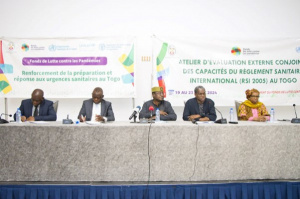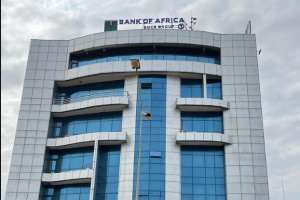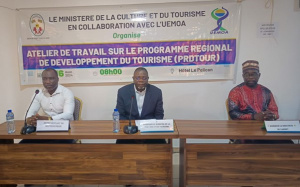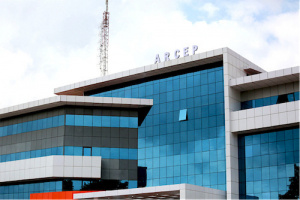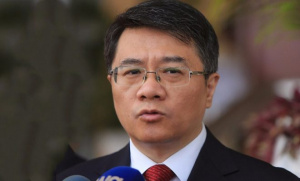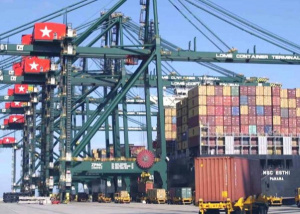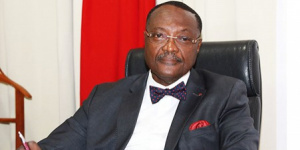Togo First
Togo: National Weather Agency Forecasts Heavy Rains in Next Three Months
The Plateaux and Maritime regions should record heavy rains in the next three months. Togo’s Weather Agency, ANAMET, disclosed the forecast to the press on August 20.
While the upcoming weather conditions are favorable for sowing, they also pose risks according to the ANAMET. The agency said there could be flooding in the watersheds of Lake Togo, Mono, and Ouémé.
To mitigate these risks, the ANAMET advises farmers to prepare their soil and start planting as soon as the first rains arrive. It also suggested that they use short-cycle, resilient crop varieties to reduce potential losses.
Last year's main rainy season saw normal to above-average rainfall. Although these conditions are beneficial for planting, they also present challenges, especially regarding flooding in Greater Lomé.
Ayi Renaud Dossavi
WAMU Securities: Togo Launches New Issue, Seeks CFA30 Billion
Togo launched a new issue on the West African Monetary Union’s securities market. Lomé seeks CFA30 billion through the operation which closes on August 22.
In detail, the treasury simultaneously issued fungible bonds and bills (OATs and BATs). It hopes to raise CFA10 billion through the BATs and CFA20 billion through the OATs. The former have a par value of CFA1 million, mature over 182 days, and have multiple interest rates. The latter have a face value of CFA10,000, and mature in three and four years at interest rates of 6.15% and 6.40%, respectively.
Proceeds of the operation will finance Togo's 2024 budget, which balances resources and expenses at 2,179 billion FCFA.
With the funds, Togo will get closer to reaching its annual target on the regional market–CFA607 billion. Over 90% of the amount has already been secured.
Esaïe Edoh
Togo Gets $19 Million from Pandemic Control Fund to Better Face Health Crises
The "Strengthening Preparedness and Response to Health Emergencies" project was officially launched in Togo on August 19. The Minister of Health, Moustafa Mijiyawa, launched the initiative in Lomé, the capital. Togo secured $19 million (approximately CFA11 billion) from the Pandemic Control Fund to finance the project.
Fruit of a collaboration with the Food and Agriculture Organization (FAO) and the World Health Organization (WHO), the project aims to help Togo–its public health system especially–be better prepared for, and resilient to, health crises.
According to the WHO, Togo “faces a high risk of epidemics, including cholera, meningitis, avian influenza, Lassa fever, Ebola, Marburg, and Mpox. The country's long land borders and highly mobile population increase its vulnerability to diseases that can cross borders.”
Over the next three years, the project will focus on improving disease surveillance, laboratory systems, and human resources to better manage and prevent future health crises
"The support and collaboration of WHO, FAO, and UNICEF are invaluable in making this initiative a success and building a healthier future for all," said Priya Basu, Executive Director of the Pandemic Fund.
Minister Mijiyawa emphasized that the project will help institutionalize integrated approaches to pandemic prevention and response based on the ‘One Health’ strategy, mobilizing resources for health system preparedness.”
The project is launched at a time when Togo faces the threat of cholera, while other African nations prepare to combat epidemics like monkeypox.
Esaïe Edoh
BOA Togo: Planned Capital Increase Raises Concerns
The Bank of Africa (BOA) is set to increase its capital for its subsidiaries listed on the BRVM stock exchange, including BOA Togo. This decision aligns with new regulations from the Central Bank of West African States (BCEAO), which require banks in the WAEMU region to maintain a minimum capital of 20 billion CFA francs, accompanied by a three-year moratorium.
In an official statement, BOA announced that it would raise capital by issuing new bonus shares. This will allow existing shareholders to receive additional shares proportional to their current holdings without needing to invest more capital. The new shares will be created by converting part of the subsidiaries' accumulated reserves into capital.
These new shares will carry dividend rights starting January 1, 2024, meaning that new shareholders will be entitled to dividends and other rights from that date.
However, BOA Togo's strategy of increasing capital through reserves raises concerns. The Togolese subsidiary has accumulated losses resulting in negative retained earnings of over 1.5 billion CFA francs in 2022 and has virtually no reserves.
The bank has not yet disclosed its net income for 2023, but it would need a non-distributable profit of over 4.5 billion CFA francs to proceed with the capital increase.
Despite these challenges, BOA Togo has demonstrated strong growth. From 2015 to 2023, its Net Banking Income (NBI) rose significantly from 2.7 billion CFA francs in its first year to 12.8 billion in the last year. Under the leadership of Youssef Ibrahimi, who took over in 2021, the bank's profits reached 2.42 billion CFA francs in 2022. In 2023, the group’s total balance sheet stood at 217.5 billion CFA francs, up from 196 billion CFA francs in 2022.
This capital increase is not just a regulatory response; it reflects BOA Togo's ambition to strengthen its position in the Togolese banking sector. The bank has recently launched significant financing programs for small and medium-sized enterprises (SMEs) with a budget of several hundred billion CFA francs.
The transaction marks the beginning of a capital increase season for other Togolese financial institutions, more than half of which must comply with the new BCEAO standards.
BOA West Africa holds a 94.46% stake in BOA Togo. The remaining shares are held by private investors, including Burkinabe businessman and Chairman of the Board, Lassiné Diawara (5%), Abdoulaye Seydi (0.47%), and Paul Derreumaux (0.04%), who served as Chairman from the bank's founding until 2011. Other small shareholders include former CEO Paulin Laurent Cossi.
In 2017, BOA Togo's capital increased from 10 billion CFA francs to 15.5 billion CFA francs.
Fiacre E. Kakpo
WAEMU: Five Togolese Financial Institutions Join BCEAO’s Instant Payment Project
In Togo, Ecobank, Orabank, BIAT, COFINA, CORIS BANK, SUNU BANK, and BOA are the seven financial institutions integrated in the pilot phase of the WAEMU’s Interoperable Instant Payment System. The last five institutions (Ecobank and Orabank are excluded) joined the platform on August 12, 2024, according to the BCEAO, the WAEMU’s Central Bank.
Across the WAEMU, 90 institutions take part in the pilot phase. These include 67 banks, 9 electronic money institutions (EMIs), and 14 decentralized financial systems (SFDs).
The ongoing pilot phase is crucial for testing the new payment infrastructure, which will be interoperable and operational 24/7. It aims to ensure that participants' systems operate under the specifications defined by the BCEAO, before the platform’s official launch.
The new infrastructure will process all types of transactions, regardless of the type of account, towards reinforcing financial inclusion and making payments more fluid across the region.
Ayi Renaud Dossavi
WAEMU: Togo Prepares for Next Phase of Regional Tourism Development Program
Last week, Lomé hosted a meeting to review the WAEMU Regional Program for Tourism Development (PRDTOUR). The WAEMU Commission initiated the gathering.
On the occasion, participants reviewed actions undertaken in Togo, as part of the program. Togo’s Minister of Tourism, Kossi Lamadokou, was present. “Many challenges still need to be tackled in Togo and other countries within the space, relating to tourism, in its tourism sector, particularly the need for sustained investments in infrastructure and adapting to digital trends while addressing security concerns,” Lamadokou said.
During the recent review, the tourism stakeholders present discussed the various activities and steps needed to ensure the success of the PRDTOUR’s new phase.
"Togo is already promising to deploy all necessary efforts to achieve the community objectives set by the WAEMU," said Minister Lamadokou.
Since 2020, Togo has been taking many steps to revitalize its tourism industry post-Covid. This year, it plans to dedicate CFA2 billion to this goal. Some of the steps announced in line with this ambition include restoring various tourist sites and building a history museum at Kamina (20km from Atakpamé).
Esaïe Edoh
Lire aussi:
Togo: ARCEP Launched New E-Services Platform
Togo's telecom watchdog, the ARCEP, has launched a digital platform, to simplify administrative procedures for users.
The platform is accessible at e-services.arcep.tg. It allows users to perform various tasks, including declaring value-added services, requesting installer approvals, and allocating numbering resources. Users can also submit requests for renewing or modifying authorizations for independent radio frequency networks.
This new platform centralizes all administrative procedures in one place. Users can create a personal account or log in with existing credentials to access online services.
The ARCEP, through the project, aims to make it easier for users to access services and save time while also promoting the digitization of public services in line with Togo's administrative goals.
Ayi Renaud Dossavi
China-Africa: FOCAC 2024 Begins on September 4
The 2024 Forum on China-Africa Cooperation (FOCAC 2024) will take place from September 4 to 6 in Beijing, China. This year's theme is “Joining Hands to Advance Modernization and Build a High-Level China-Africa Community with a Shared Future”.
The event was announced by Chao Weidong, China's ambassador to Togo, during a media meeting in Lomé last weekend.
Ministerial meetings will be held ahead of the event, to draw up agreements that may signed. FOCAC 2024 will also feature a China-Africa business conference, a roundtable that should help enhance bilateral relations and foster economic and cultural exchanges.
According to Ambassador Chao, the summit could help bolster the relationship between China and Africa. Commenting on Togo’s position in this relationship, the diplomat said the West African country “always gives its firm support to the construction of FOCAC and takes an active part in the solidarity, cooperation, and common development between China and Africa.""We attach great importance to Togo's participation in this cooperation mechanism, which is essential for dialogue and pragmatic cooperation," he added.
China is Tog’s top source of imported goods. In H1 2023, trade between the two partners reached $2.3 billion, up 14% year-on-year.
Ayi Renaud Dossavi
Togo: Lomé Port Ranks 93rd in 2024 Lloyd’s List
The Port of Lomé (PAL) moved up one spot in LLoyd’s latest Top 100 Container Ports Index. The Togolese port ranked 93rd this year.
According to Lloyd’s List, the West African port handled 1.9 million TEUs (twenty-foot equivalent units) in 2023, from 1.8 million TEUs in 2022(+5%).
The PAL is the only sub-Saharan African port ranked in the Top 100 list. "Lomé is now the sole sub-Saharan African port to feature in this prestigious ranking, confirming its status as a leader in the region," commented Edèm Téngué, Togo’s Minister of Maritime Economy.
Across the whole continent, however, it is behind several ports, including the Port of Tangiers in Morocco (19th), the Port of Suez in Egypt (47th), the Port of Durban in South Africa (78th), and the Port of Damietta, also in Egypt (90th).
Asian ports dominate the ranking, globally. The top 10 ports are from Asia, with China’s Port of Shanghai in first position. The ports of Singapore and Ningbo-Zhoushan (China) are next.
Lomé's improved ranking can be attributed to reforms undertaken by the authorities to reduce costs and streamline procedures within the port. "With modern infrastructure, exemplary management and a forward-looking vision, the Port of Lomé now ranks 5th among African ports. This international recognition testifies to Togo's ongoing commitment to making Lomé a strategic hub for maritime trade in Africa," Tengue emphasized.
Esaïe Edoh
Togo: Chamber of Trade Gets New Boss, José Symenouh
The Togolese Chamber of Trade and Industry, CCIT, has a new boss: José Symenouh. He was elected last Friday, August 16, in Lomé, at the first session of the Chamber’s new consular assembly.
Symenouh, former manager of NSIA-Togo, won 43 of 75 votes and came ahead of Patrick Magnon, who won 31 votes.
The CCIT’s new chairman is a well-known businessman in Togo. He headed several businesses across various sectors–including insurance and higher education. He currently heads the Association des Grandes Entreprises du Togo (AGET)(Togo’s Large Business Association) and owns an insurance and engineering consulting firm.
As the CCIT’s boss, Symenouh will help foster cooperation between the private sector and the government. Symenhou’s predecessor was Natahlie Bito. She was appointed in December 2020.
Esaïe Edoh



